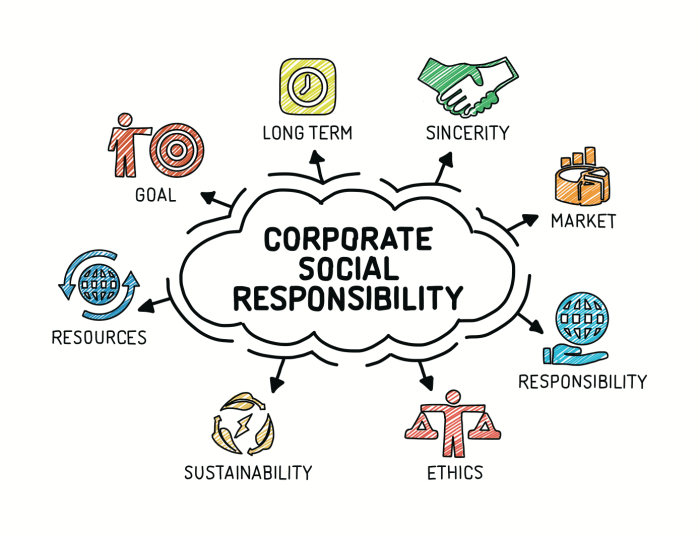Yo, diving into the world of corporate social responsibility, where businesses make moves to do good while doing well. From defining CSR to exploring its impact, this topic is all about walking the talk and making a difference.
Overview of Corporate Social Responsibility

Corporate Social Responsibility (CSR) is the practice of businesses operating in a manner that benefits society as a whole. This involves taking responsibility for the impact of their activities on customers, employees, communities, and the environment.
CSR is important in business practices as it helps build a positive reputation, foster employee engagement, attract customers, and contribute to sustainable development. Companies that prioritize CSR are often seen as more ethical and trustworthy, leading to long-term success.
Examples of Well-Known Companies Excelling in CSR Initiatives
- Apple: Apple is known for its commitment to renewable energy, recycling programs, and ethical sourcing of materials.
- Patagonia: Patagonia is a leader in sustainable fashion, promoting fair labor practices and environmental conservation.
- Microsoft: Microsoft focuses on accessibility and diversity, as well as investing in education and environmental sustainability.
Benefits of Corporate Social Responsibility
Corporate Social Responsibility (CSR) offers numerous advantages to companies that choose to implement it. Not only does it benefit society and the environment, but it also brings positive outcomes for the business itself.
Enhancement of Company Reputation
Implementing CSR initiatives can significantly enhance a company’s reputation. By engaging in activities that contribute to the well-being of communities and the environment, companies build a positive image that resonates with consumers. This can lead to increased brand loyalty, positive word-of-mouth, and a competitive edge in the market.
Positive Impact on Employee Morale and Engagement
CSR initiatives can also have a direct impact on employee morale and engagement. When employees see that their company is committed to making a difference beyond just profits, it can boost their sense of pride and purpose in their work. This, in turn, can lead to higher levels of employee satisfaction, motivation, and productivity. Companies that prioritize CSR are more likely to attract and retain top talent who value social responsibility in the workplace.
Strategies for Implementing Corporate Social Responsibility
Implementing Corporate Social Responsibility (CSR) into business operations requires thoughtful planning and strategic execution to ensure long-term success. Companies can adopt various approaches to integrate CSR effectively, aligning their values with societal needs. Let’s explore different strategies and examples of successful CSR initiatives across industries, along with the challenges companies may encounter during implementation.
1. Stakeholder Engagement
Stakeholder engagement is a key strategy for implementing CSR, involving communication and collaboration with internal and external stakeholders. By understanding the expectations and concerns of stakeholders, companies can tailor their CSR initiatives to create a positive impact. For example, Patagonia’s collaboration with environmental organizations and engaging customers in their sustainability efforts has been a successful CSR strategy in the retail industry.
2. Sustainability Practices
Integrating sustainable practices into business operations is another effective CSR strategy. Companies can focus on reducing their environmental footprint, promoting ethical sourcing, and implementing green initiatives. For instance, Unilever’s Sustainable Living Plan emphasizes sustainable sourcing, waste reduction, and social impact, setting a benchmark for CSR in the consumer goods industry.
3. Community Involvement
Community involvement is a powerful CSR strategy that allows companies to give back to the communities where they operate. This can include supporting local charities, volunteering programs, and community development projects. Starbucks’ community store program, which hires staff from economically disadvantaged areas and invests in community projects, demonstrates a successful CSR strategy in the food and beverage industry.
4. Ethical Business Practices, Corporate social responsibility
Adopting ethical business practices is essential for companies looking to implement CSR effectively. This includes promoting transparency, integrity, and fairness in all aspects of operations. The Body Shop’s commitment to cruelty-free products, fair trade sourcing, and activism against animal testing showcases a successful CSR strategy in the beauty and cosmetics industry.
5. Measurement and Reporting
Measuring the impact of CSR initiatives and transparently reporting progress is crucial for successful implementation. Companies can use key performance indicators (KPIs) and sustainability reports to track their CSR efforts and communicate results to stakeholders. IBM’s annual corporate responsibility report, highlighting progress in environmental sustainability, diversity, and community engagement, sets a standard for CSR reporting in the technology industry.
6. Employee Engagement
Engaging employees in CSR initiatives can enhance morale, productivity, and overall company culture. Companies can offer volunteer programs, sustainability training, and opportunities for employees to contribute to social causes. Google’s employee-driven philanthropy program, Google.org, empowers employees to support charitable initiatives and social impact projects, showcasing a successful CSR strategy in the tech industry.
Corporate Social Responsibility and Sustainability

Corporate Social Responsibility (CSR) and sustainability go hand in hand, with sustainability being a key component of CSR efforts. Sustainability focuses on meeting the needs of the present without compromising the ability of future generations to meet their own needs. By incorporating sustainable practices into their CSR initiatives, companies can ensure long-term positive impacts on society, the environment, and the economy.
Relationship between CSR and Sustainability
The relationship between CSR and sustainability is clear – CSR encompasses a company’s efforts to operate in an economically, socially, and environmentally sustainable manner. This means taking into account the impact of business activities on all stakeholders, including employees, customers, communities, and the environment. By integrating sustainability practices into CSR, companies can create shared value for both their business and society.
How CSR Practices Contribute to Environmental Conservation
- Implementing energy-efficient practices to reduce carbon emissions.
- Adopting sustainable sourcing methods to protect ecosystems and biodiversity.
- Investing in renewable energy sources to reduce reliance on fossil fuels.
- Reducing waste through recycling and waste management programs.
Case Studies of Companies Incorporating Sustainability into CSR Efforts
Company A has committed to reducing its carbon footprint by 50% by 2030 through the use of renewable energy sources and energy-efficient practices.
Company B has implemented a zero-waste policy in its manufacturing processes, recycling and repurposing materials to minimize environmental impact.
Company C has partnered with local communities to support reforestation projects, contributing to environmental conservation efforts while benefiting local stakeholders.